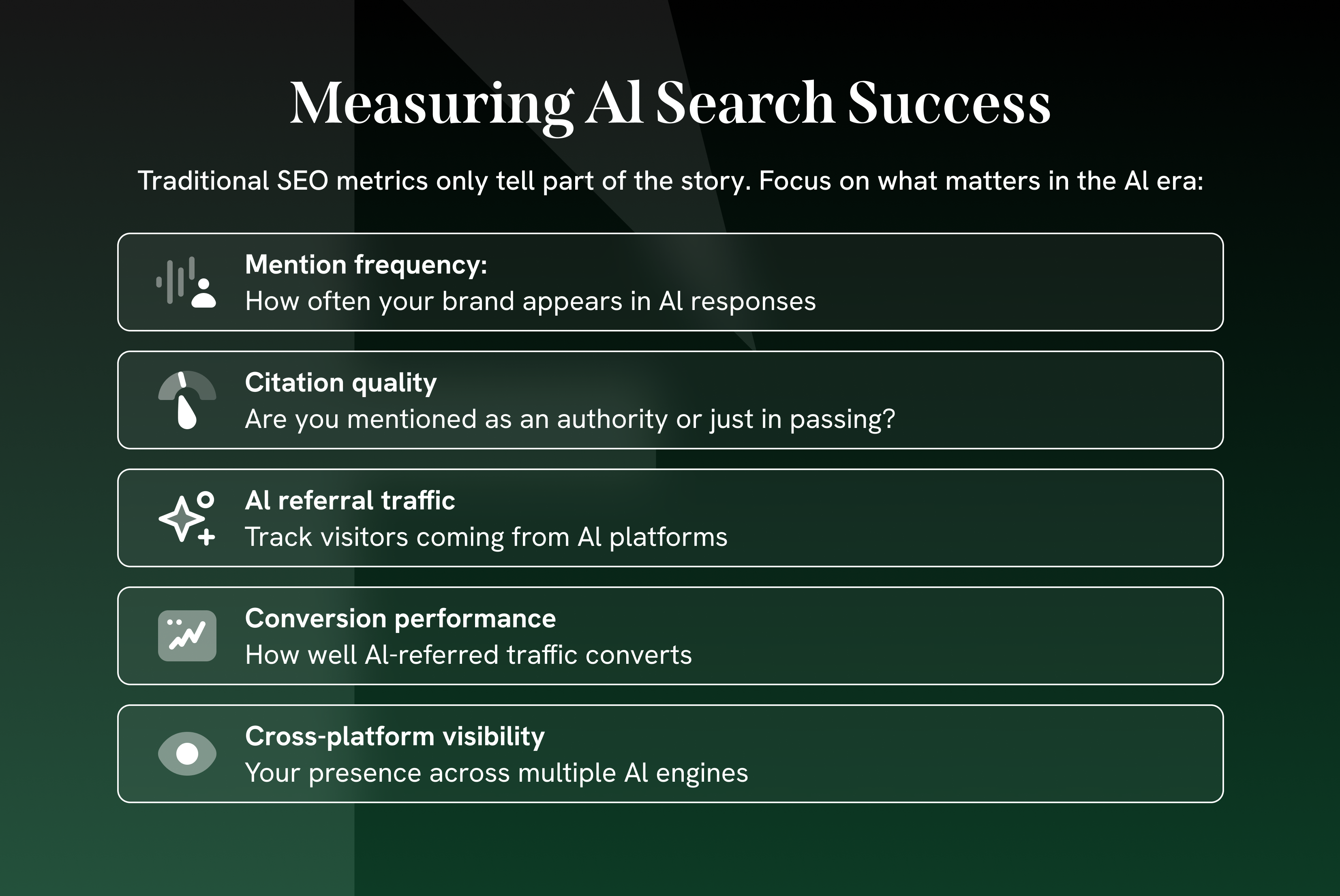Beyond Page One: AI Search is Rewriting Shopping Discovery— and Why Your Brand May Not Be Seen




No more chasing the top ten spots. No more obsessing over that desired first position in Google.
With AI-powered search tools, there’s only one answer that matters and if it’s not yours, you’re invisible. Your customers aren’t searching the way they used to.
They’re not typing “best running shoes” into Google and clicking through links.
They’re asking ChatGPT: “What are the best running shoes for someone with flat feet who runs 5 miles a day?” And they’re getting one definitive answer. If your brand isn’t part of that answer, you don’t exist.
This isn’t the future. It’s happening now:
The question isn’t if AI will change brand discovery. The question is: will your brand be discovered at all?

Most ecommerce brands don’t know what AI is saying about them. They know their Google rankings and track organic traffic, but they have no idea how often AI engines mention their products, or worse, recommend competitors instead.
It’s like running a store in a mall where 40% of shoppers now ask the concierge for recommendations instead of browsing. If the concierge doesn’t know your store exists, those shoppers will never find you.
Now imagine you could see exactly what the “AI concierge” is saying about your brand.
What if you could track every mention, monitor every recommendation, and optimize your content so AI engines choose you over competitors? What if you could turn AI search from a hidden threat into your biggest growth driver? That’s exactly what FERMÀT’s AI Search Commerce Engine delivers.
A major shift is underway in how customers discover brands, and it’s opening new opportunities for those ready to adapt.
The old discovery model was built on choice. Customers searched, browsed multiple sites, compared features and prices, then made a decision.
The new discovery model is built on trust. Customers ask AI a specific question and act on the answer. They don’t want ten options. They want one great recommendation they can feel confident in.
This isn't just a tweak to search behavior. It's a fundamental rewiring of the customer journey.
The ripple effects are already visible. Brands that understand this shift are capturing higher-quality customers while their competitors wonder where their traffic went.
AI-referred traffic isn’t just different, it’s far more valuable. Customers arrive with higher intent because the AI has already qualified them. They trust recommendations more, since AI feels like an objective, reliable source. They move through the funnel with less friction, skipping endless comparisons because AI has done the heavy lifting. And they’re a better fit, as AI considers context, preferences, and specific use cases to match customers with the right products.
But here’s the challenge most brands face with Answer Engine Optimization (AEO): AI queries demand incredible specificity and scale. Traditional SEO could be broad, one “running shoes” page might capture dozens of searches. AI users, on the other hand, ask hyper-specific questions like:
Meeting this demand means creating content that answers thousands of narrow, detailed queries. That once seemed impossible, until now.
Understanding AI search importance is step one. Real advantage comes from execution, clear, practical strategies that make your brand the one AI engines recommend.
1. Think Questions, Not Keywords
AI engines answer questions, not keywords. Shift from optimizing for "wireless headphones" to answering "What are the best wireless headphones for working out?"
• Index customer questions from reviews, support tickets, and social comments
• Lead with direct 40-60 word answers, then add supporting details
• Restructure content around problems solved, not just product specs
2. Build Comprehensive Q&A Hubs
Create organized answer centers that address every customer concern:
• Cover sizing, shipping, returns, durability, comparisons
• Use natural-language question headings with proper schema markup
• Keep answers concise but genuinely helpful (40-60 words optimal)
3. Optimize for Conversational Search
AI search mirrors how people actually talk:
• Target natural, longer queries: "best cargo shorts under $50 from popular brands"
• Use question words (who, what, how) and qualifiers (best, cheapest, fastest)
• Write in short, clear sentences that sound natural when read aloud
4. Build Demonstrable Authority
AI engines favor sources they can trust:
• Publish comprehensive guides, comparisons, and expert insights
• Keep all content fresh, accurate, and up-to-date
• Cover the complete customer journey from research to post-purchase care
5. Leverage Authentic Customer Voices
Real customer language builds AI trust:
• Highlight reviews and organize them by features and use cases
• Create FAQs based on actual customer questions and language
• Encourage customers to ask and answer questions about your products
6. Optimize Across Multiple AI Platforms
Each platform has different strengths and preferences:
• ChatGPT: Detailed, conversational responses
• Google AI Overviews: Commercial queries and local results
• Voice assistants: Quick, actionable responses
Track your brand's performance across all major AI platforms to ensure comprehensive visibility.

While others chase Google rankings, leading brands are building trusted relationships with AI engines, the new gateway to commerce.
The opportunity is wide open today, but it won’t stay that way for long. As more brands embrace Answer Engine Optimization (AEO), competition will rise.
Those who move early, while AI engines are still deciding which sources to trust, will secure lasting advantages and stronger visibility.
Your customers are already turning to AI for recommendations. The real question is: will AI recommend you?